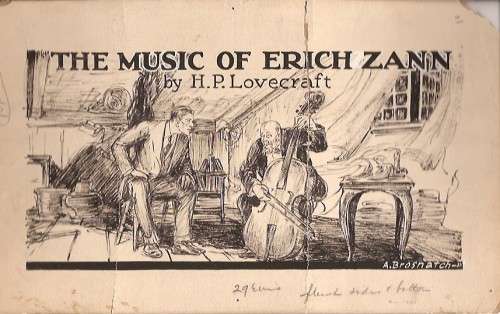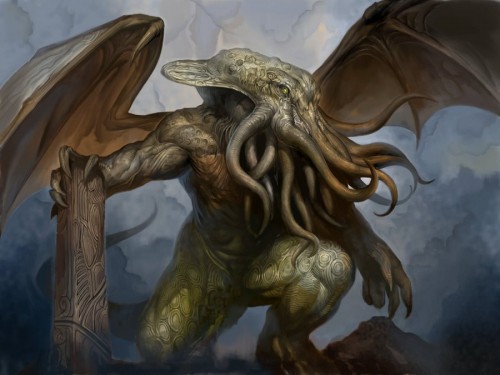Author Spotlight
Overboard
I.
On this particular evening, the musician allows his fellow lodger in the house on Rue d’Auseil to listen to his feverish viol music. “It would be useless to describe the playing …. He was trying to make a noise; to ward something off or drown something out—what, I could not imagine,” writes H.P. Lovecraft in “The Music of Erich Zann.” The listener, a metaphysics student at an unnamed university, is an interloper, a voyeur who, on hearing Erich Zann fill his garret room with this crazed playing, hopes to peak into the source of the music’s beauty, to penetrate some “far cosmos of the imagination.” On this particular evening, the cosmos stabs back. Lovecraft describes Zann’s playing, which grows “fantastic, delirious, and hysterical …. [l]ouder and louder, wilder and wilder,” until other-worldly chaos and pandemonium explode into the house on Rue d’Auseil and the listener flees. It is a bit much.

Howard Philips Lovecraft wrote “The Music of Erich Zann” in 1917. Over the next 20 years, he would go on to write his best known tales of horror and wonder, those involving Cthulhu, Nyarlathotep, and Azathoth, his mythos monsters, the Great Old Ones whose names you can’t pronounce. The language in “Erich Zann” is toned-down, tolerable, a pale lilac compared to the rich purple of his later prose, where, as Michel Houellebecq writes, “the adjectives and adverbs pile upon one another to the point of exasperation, and he [Lovecraft] utters exclamations of pure delirium.” Most readers would not consider anything by H.P. Lovecraft well-written in the traditional sense, and yet there is power in his work, a majestic and odd darkness that isn’t matched by much else, an appeal to the unimaginable, our dread of looking into the night sky and hoping, only hoping, we’re alone. Lovecraft’s best sentences are always overwrought. There are excesses of bland fright words—“monstrous”, “horrible”, “grotesque”—mixed with archaic vocabulary, weird words that both in texture and meaning evoke the unusual, “eldritch”, “rugose”, “squamose”; there are extended hallucinations, delirious exclamations, and dream descriptions of nightmare cities, all of which are the antithesis of subtlety. All stylistic restraint has been set aside. Lovecraft eschews any kind of linguistic modesty so he can unleash his unmistakably curious vision of cosmic horror and god-things—this is the source of his style.
“HPL would probably have considered a story a failure, if in writing it he did not have a chance to go overboard once at least,” Houellebecq writes in H.P. Lovecraft: Against the World, Against Life (published in France in 1991; translated into English by Dorna Khazeni and published by Believer Books in 2005). Houellebecq, a French novelist who writes about sex, brand names, technodystopian malaise, and ennui-ridden postmodern consciousness (very French, yes), sees Lovecraft as an American original whose uncompromising weirdness and “stylistic explosion[s]” lead to a unique body of work, the sole goal of which is to fascinate the reader. Houellebecq sets Lovecraft up against more mundane sci-fi and horror writers and against all realism. Lovecraft, Houellebecq argues, whose style is defined by precisely that which it’s easiest to criticize, is interesting not in spite of his grandiose and ridiculous prose, but because of it.
It’s easy to take too much for granted when thinking about books, to avoid fundamental questions—questions such as, Must the characters be human? Should events unfold though comprehensible cause-and-effect in a realistic manner? Will there be aliens? (So much fiction is blandly the same because although their prose styles may vary greatly, authors answer these fundamental questions in the exact same way.) As readers, we’re asked to accept whatever fictional world the author submits. If reviewing some pleasantly realistic novel about familial conflict and interpersonal relationships, it would not be kosher to write, “This book would have been better with more space monsters and fewer descriptions of kitchen appliances.” And yet these fundamental questions control a story more than a single sentence or paragraph ever can. Lovecraft’s work, Houellebecq says, is founded on two fundamental rejections: no sex and no money. “He deliberately chose to ignore what he considered uninteresting or artistically inferior. And this very limitation gives him power and distinction.” Without money and without sex, those two key players in so many stories, Lovecraft was able to invent and explore strange realms filled with incomprehensible horror and alien evil. This amounts to an entrenched rejection of most fiction and of ordinary life.
Feedback can impede the development of style. For Lovecraft, it’s the passages that a well-meaning editor would have x’ed out that define his writings. “Excision by others is probably one reason why no living American author has a real prose style,” Lovecraft wrote in a letter sent to Weird Tales magazine in 1923. Lovecraft stated that, if published, not a comma or semi-colon in his stories could be altered. Only by total self-indulgence, by allowing for every extravagance of his imagination and refusing to amend the deep flaws in his writing (Stephen King rightly says that Lovecraft’s dialogue is often “stilted and lifeless, brimming with country cornpone”), was Lovecraft able to pursue his furious vision to the fullest: The tall, gaunt man in a once good-looking suit, a divorcee who’s fled from Brooklyn back to his hometown of Providence, Rhode Island, where he eats little, refuses to leave his aunts’ house, and writes strange stories late into the night, this man has style.
II.
Here is the first paragraph of “Call of Cthulhu”, a story Lovecraft wrote in 1926: “The most merciful thing in the world, I think, is the inability of the human mind to correlate all its contents. We live on a placid island of ignorance in the midst of black seas of infinity, and it was not meant that we should voyage far. The sciences, each straining in its own direction, have hitherto harmed us little; but some day the piecing together of dissociated knowledge will open up such terrifying vistas of reality, and of our frightful position therein, that we shall either go mad from the revelation or flee from the light into the peace and safety of a new dark age.”
“Call of Cthulhu” is the first in a series of stories that deal with the Great Old Ones, freak-beings who exist in outerspace or are asleep on the ocean floor and who inhabit the peripheries of our worst nightmares. This story, narrated by a smart, bland young man who’s trying to discover the real cause of his uncle’s death, is a collage of scientific findings, police reports, analyses of dream journals, newspaper clippings, and monsoons of adjectives, descriptions that at first rankle then eventually overload the reader’s senses; there are many passages which hint then more-than-hint at such “terrifying vistas of reality” that exist barely beyond our dreams. Lovecraft annihilated every traditional topic, every bit of psychology, and every stylistic restraint to find out what he’d be left with: only the dark, depthless pit of his own imagination expressed as gods and monsters, Cthulhu, Yog-Sothoth, and the Great Race of Yith, these attempts to name the namelessness of fear.

Fear is not a literary emotion. It’s an embarrassment, the kind of thing that brings you back to childhood, where you’re still afraid of what goes bump-in-the-night. Lovecraft’s stories mix fear with fascination, a usual combination perfected into a thick potion that goes down easy and comes back up harsh and unnerving in the black of the night.
Houebellecq’s point is that Lovecraft’s prose, so often full of excesses, combined with an across-the-board rejection of traditional fictional topics and a total acceptance of the bizarre and occult, makes Lovecraft one of the most intriguing American writers of the 20th century. Like Erich Zann’s music, there’s a possessive quality to Lovecraft’s stories, a demonic enchantment that fascinates and justifies the extravagances. The very passages that a scholarly reader would try to excuse are the ones “true fans prefer.” Of course, Lovecraft’s writing isn’t well-written—it lacks subtlety, simplicity, clear emotional descriptions, and contains tons of adverbs. But then the least interesting thing to say about a book is that it’s well-written.
III.
Whether or not you enjoy Lovecraft’s work (I’m somewhat of a fan), there is something exciting about reading him because his stories are so unrelentingly weird. Lovecraft has an originality that can’t be overlooked. When I was 19, I had a part-time job working at a nursing school. I got very good at doing phlebotomy on a robot. I could hit a vein 95% of the time. On our breaks, my friend Ashley and I would practice phlebotomy on the robot arm. We’d draw blood using the videogame-like system and watch the blood fill up the virtual syringe on the video screen. The IT expert in the building was named Philip. Philip was a chubby guy in his mid-thirties, which to Ashley and me was incredibly old. He was a movie nerd and loved Ed Wood. Ed Wood was a genius, according to Philip.
“Oh yes, he was terrible,” Philip said about Ed Wood. “But he was so terrible. Nobody else could do terrible like him. Nobody!” Philip cherished Ed Wood because Eddie was uniquely awful. Eddie possessed a peculiar and outlandish awfulness that served as some disastrous proof of the auteur theory; whatever Ed Wood touched turned to earnest zombie kitsch. Eddie wrote dialogue that was so kooky, so unmistakably his own, my co-worker Philip could tell if a movie was an Ed Wood or not from a single line. A part of me has always respected Ed Wood because of this. At times, reading Lovecraft, I understand Philip’s passion for Ed Wood, a passion which could only be so intense because Ed Wood was so bad. While Lovecraft’s language is often redundant and predictably over-the-top, his approach is dedicated, encompassing, and unapologetic. The effect is impressive. For a moment I’m the listener in the garret room, eavesdropping on demonic sounds that titillate my imagination and make me think that the night sky is really a thin veil beyond which exist the Great Old Ones, whose silly names I always stumble over.
“That is not dead which can eternal lie, / And with strange aeons even death may die.”
Philip was the kind of person who would talk at you about his passions because he had no one else to tell them to. We’d be on our break, poking the robot arm. He’d come in and explain what a demented genius Ed Wood was. We’d smile, nod, and go back to seeing who could draw more virtual blood. Ashley and I always joked about doing phlebotomy for real but never did.
***
Alex Kalamaroff is a 26-year-old writer living in Boston. He works on the administrative team of a Boston Public Schools high school. You can read his other writings here or follow him on twitter @alexkalamaroff.
Tags: Alex Kalamaroff, houellebecq, lovecrat, style

eldritch is a pretty good word. I like cyclopean even more, he uses that one too
this is so good
“… the least interesting thing to say about a book is that it’s well-written.”
Score.
ZZZZIPP ALSO IMAGINED PULLING THAT SENTENCE OUT OF THE ARTICLE AND ARRANGING IT WITHIN QUOTES
“… pulling that sentence out of the article and arranging it …”
fyeah